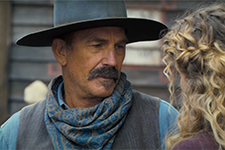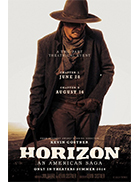Horizon: An American Saga—Chapter 1
|  Writing about his Oscar-winning directorial debut Dances With Wolves (1990), the great critic Pauline Kael quipped that Kevin Costner had feathers in his hair and feathers in his head. One can only imagine what she might have written had she lived to see Costner’s fourth directorial effort, Horizon: An American Saga—Chapter 1, the first of a planned four-film epic about the violent struggle over the American West in the late 1800s. Running just over three hours in length, this opening chapter is primarily set-up, establishing two dozen major characters—European settlers, Apache warriors, bounty hunters, horse traders, wagon train riders, U.S. Cavalry officers, prostitutes, entrepreneurs—in a half-dozen someday-to-be-interconnected plots. There is no small degree of ambition here, and perhaps some foolhardiness on Costner’s part, to launch such a massive endeavor, but it isn’t hard to imagine the arguments in his favor. After all, the world of streaming has launched a golden era of screen storytelling that reaches far and wide, including Taylor Sheridan and John Linson’s Yellowstone (2018–), which Costner anchored for six years, so why not try something similar on the big screen? Dividing huge stories into multiple movies has worked like gangbusters before, most notably Peter Jackson’s The Lord of the Rings trilogy (2001–2003), whose first film, The Fellowship of the Ring was, much like Costner’s first installment of Horizon, mostly set-up for what was to come. Denis Villeneuve recently did the same thing with Dune: Part One (2021) and Part Two (2024), so if pre-planned multi-film franchises could be successfully built in the realms of fantasy and science fiction, why not the western? From the various reports I have read, Horizon has been with Costner a long time—at least since 1988, when he was best known for The Untouchables (1987) and Bull Durham (1988) and hadn’t yet been bestowed with Oscar glory for Dances With Wolves, which, lest we forget, was a massive gamble on a then-unpopular genre by a first-time director. As time has gone by, Costner’s ambitions for the project have only grown larger, as characters and stories have been added and expanded, resulting in something that will turn out to be either epic or bloated (or both). Costner’s simultaneous admiration of America’s past and recognition of all the struggle and bloodshed it entailed has been central to all the movies he has directed—not just Dances With Wolves, but also his uneven post-apocalyptic drama The Postman (1997) and his more conventional western Open Range (2003). It has been nearly two decades since Costner was behind the camera, but as he demonstrated in those earlier films, he still has a great sense of scale, of how to frame the landscape and how to balance the enormity of his story’s world with the intimacy of his characters’ faces. He and cinematographer J. Michael Muro, who worked as a Steadicam operator on Dance With Wolves and made his feature debut as cinematographer with Open Range, give the film more than its fair share of beautiful backdrops, which range from rows of white-barked ash trees with autumn leaves in full golden glory, to the frozen-gray Montana tundra, to the craggy grandeur of the desert southwest that evoke so many red-hued John Ford Monument Valley westerns. The title of Horizon comes from the name of a proposed town on the banks of a river in the Arizona territory, where ambitious and naïve white settlers arrive, having purchased plots of land from a European land dealer. As it turns out, this land sits squarely in the middle of the hunting grounds used by a tribe of Apache who live up in the mountains, which establishes immediate conflict between the European settlers and the indigenous people who have already been attached to the land for generations. That conflict leads to immense violence, when an Apache war party attacks the settlement in the night, slaughtering men, women, and children and burning all of the buildings—most of which are tent houses and a dance hall—to the ground in a lengthy, brutal sequence of blood and fire that risks making the Apache irredeemably abhorrent. It doesn’t help that this sequence occurs so early in the film because we don’t know any of the characters yet, although we get to know a few of them through the violence, including the Apache warrior Pionsenay (Owen Crow Shoe), who leads the charge against the wishes of his tribal leader, Tuayeseh (Gregory Cruz), and Frances Kittredge (Sienna Miller), whose husband and teenage son are killed in the carnage. She and her preadolescent daughter Elizabeth (Georgia MacPhail) are some of the few who survive and are taken in by the U.S. Cavalry, which comes to clean up the mess. She is soon drawn to First Lt. Trent Gephardt (Sam Worthington), who is both kindly in his treatment of others and rational in his understanding of how westward expansion will invariably lead to bloodshed. In this respect, he is set up as the film’s tortured conscience. Another plotline involves Ellen Harvey (Jena Malone), who shoots a man in cold blood in the dead of winter in Montana and then runs for her life, only to be pursued by the man’s vicious brothers (Jamie Campbell Bower and Jon Beavers),who swear to avenge his death at the behest of their mother, who carries herself like a matriarchal mafioso. Ellen becomes a wife and mother in a small western settlement, and she shares a home with Marigold (Abbey Lee), a prostitute who catches the eye of Hayes Ellison (Kevin Costner), a stoic horse trader who ends up becoming her protector. Also interwoven is the story of a wagon train heading through Kansas that is led by Matthew Van Weyden (Luke Wilson), who must deal with both potentially violent Native Americans whose land they are crossing and various conflicts among the would-be settlers, much of which derives from the presence of Hugh Proctor (Tom Payne) and Juliette Chesney (Ella Hunt), an upper-crust British couple who don’t seem to understand (or care about) the in’s and out’s of hard-scrabble life on the open range. And then there’s the subplot about an adolescent boy who escaped the slaughter in Horizon and hooks up with a group of bounty hunters who are set on getting revenge, even if said revenge ends up being directed at a tribe that had nothing to do with the earlier violence. I could go on (and mention other characters played by veteran character actors like Will Patton, Michael Rooker, and Danny Huston), but you can see what is happening here: Costner and co-screenwriter Jon Baird are throwing a lot of balls in the air and trying to juggle them enough to sustain interest while also promising more to come (including the introduction of Giovanni Ribisi’s Pickering, the European land dealer who sold the plots of land that were to become Horizon; he is frequently mentioned here, but never really seen). Which, of course, is what makes it so difficult to assess the first chapter of Horizon. It is only partially successful as a stand-alone experience, but may very well prove to be a strong foundation for what is to come (the second chapter is set to be released later this summer, while chapters three and four are currently in some stage of production). While this first Horizon film doesn’t really work in and of itself, one gets the sense that it isn’t necessarily supposed to—or, at least, Costner and Baird realized that they couldn’t do all they really wanted to, even within the broad confines of a three-hour running time. There are simply too many stories and too many characters to do much more than paint in broad strokes that we can only hope will come into sharper focus with more engaging detail in subsequent chapters. That is holding out a lot of hope, but there is enough that is good—even borderline great—in Horizon—Chapter 1 to suggest it will be worth it in the end, which is perhaps why Costner decided to end the film with a rapid-fire montage of shots from the next film, cut together in standard movie trailer fashion to suggest a lot of sound and fury and payoff. Let’s hope that there is more in Costner’s head than feathers. Copyright © 2024 James Kendrick Thoughts? E-mail James Kendrick All images copyright © New Line Cinema |
Overall Rating: 

 (3)
(3)


